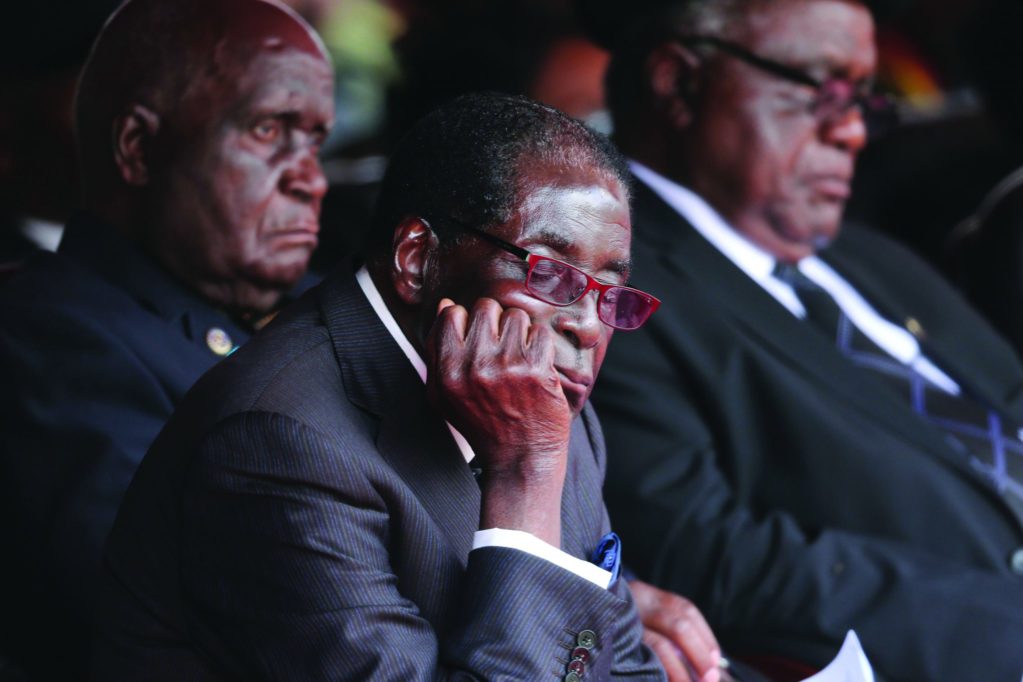On February 21, President Robert Gabriel Mugabe will be 91. He has ruled Zimbabwe for 34 years making him the only leader the country has ever known and the oldest president in the world. The question grows by the day, who will run the country next?
It has been a poor few months for the aging Mugabe. He shocked delegates at the December party congress when for the first time he mistakenly uttered a slogan against his party – Pasi neZanu-PF (down with Zanu-PF).
Prior to that, he had also told a meeting that his foe and MDC-T leader Morgan Tsvangirai had won the 2008 polls by 73%. He had to be corrected on both occasions by his close aides.
Political analyst Rashweat Mukundu says his wife Grace Mugabe, has become the de-facto Prime Minister capitalizing on her husband’s failing health.
“There is uncertainty and concern on the future of Zimbabwe as President Mugabe brutally suppresses any talk of succession and this has stalled policy clarity as no one is sure of the future. The economy has thus suffered hugely from the uncertainty and the intense focus on succession and power issues instead of service delivery and the economy,” says Mukundu.
The wheels started turning on December 9 when guerrilla fighter-turned leader Joice Mujuru, long viewed as a front runner in Zimbabwe’s succession race, was booted by Mugabe as Vice President.
On December 10, Mugabe appointed Minister of Justice Emmerson Mnangagwa his First Vice President and Phelekezela Mphoko, former Ambassador to South Africa, the Second Vice President. He has been dismissed as an also ran in Zimbabwe’s politics of succession.
Mnangagwa took over from Mujuru with help from the First Lady.
Grace is evidently an admirer of Mnangagwa or sees him as a weapon to fight her battles with the former Vice President.
Grace was known for her lavish lifestyle and poor academic performance in the months leading up to the December congress. She recently obtained a PhD from University of Zimbabwe, a doctorate she allegedly never studied for.
With others, she accused Mujuru of plotting to assassinate her husband, in a bid for power. Mujuru, a party loyalist, denies this.
The congress, that endorsed Mugabe as the party’s candidate for the 2018 elections, was castigated by former political heavyweights, like former Zanu-PF spokesperson Rugare Gumbo, as a ‘praise and worship’ function rather than an elective congress. Mugabe is without doubt losing control and it appears his wife is taking control.
Obert Hodzi, a Zimbabwean security researcher based in Hong Kong, sees striking similarities between Mugabe’s last days and that of China’s Chairman Mao.
“When Mao became very old and frail, his wife Jiang Qing and her close associates, Zhang Chunqiao, Yao Wenyuan and Wang Hongwen, created their own center of power preparing to take over when Mao dies. They carried out extensive purges and executions of anyone perceived to be would-be successors,” he says.
“This is exactly what we are seeing in Zimbabwe. We are likely to see the dominance of Grace and her associates for a while and even after Mugabe’s demise.”
According to the Zimbabwean constitution (Amendment No.20 of 2013, the Sixth Schedule, section 14 (4) if the president dies, resigns or is removed from office – (a) the Vice President or, where there are two Vice Presidents, the Vice President who was last nominated to act in terms of the Constitution – acts as President until a new President assumes offices; and the vacancy in the office of the President must be filled by a nominee of the political party which the President represented when he or she stood for election. A political party which is entitled to nominate a person in terms of subparagraph (4) (b) must notify the Speaker of the nominee’s name within ninety days after the vacancy occurred.
Dewa Mavhinga, lawyer and senior researcher for Zimbabwe and Southern Africa at Human Rights Watch, says that section 101 of the Constitution, which says that the Vice President takes over to finish the term of office, does not apply in this case as the Sixth Schedule supercedes section 101. Under this section, the political party nominates and notifies the Speaker of the nominee who takes oath of office to finish the term.
“His party Zanu-PF will nominate a successor, so it means succession is not automatic for VPs and could trigger chaos and instability given that the leadership of Zimbabwe security forces is highly politicized and partisan and could take sides in the succession disputes,” says Mavhinga.
Mavhinga says if securocrats prefer someone other than the First Vice President, the dynamics could tilt dramatically. Whoever takes over must purge more of Mujuru’s sympathizers in parliament and garner support in both the politburo and central committee.
Mnangagwa, a less charismatic leader than Mujuru, could stand against the Movement for Democratic Change (MDC) leader in the 2018 elections should Mugabe, who would then be 94, fail to run as the party’s candidate. Morgan Tsvangirai’s opposition MDC party says they are poised to win the next elections. This would mean Mnangagwa’s long-held ambitions could slip through his fingers.
“All indicators are pointing to a resounding victory of Morgan Tsvangirai and the MDC-T provided the elections are free and fair,” says MDC party spokesperson Obert Gutu.
“We are taking very far-reaching steps to ensure that the next elections in Zimbabwe will be held in a free and fair environment that will produce a legitimate and uncontested outcome. For strategic reasons, I am not at liberty to disclose our game plan, suffice to state that the Zanu-PF regime will not be allowed to have its cake and eat it.”
You could argue Zanu-PF had its cake and ate it for nearly 35 years. Food is at stake in the fight. Whoever takes over needs to drag Zimbabwe back to the long-lost position as the breadbasket of Africa.
A grim power struggle will play out first before the green shoots of maize can even be thought of.
